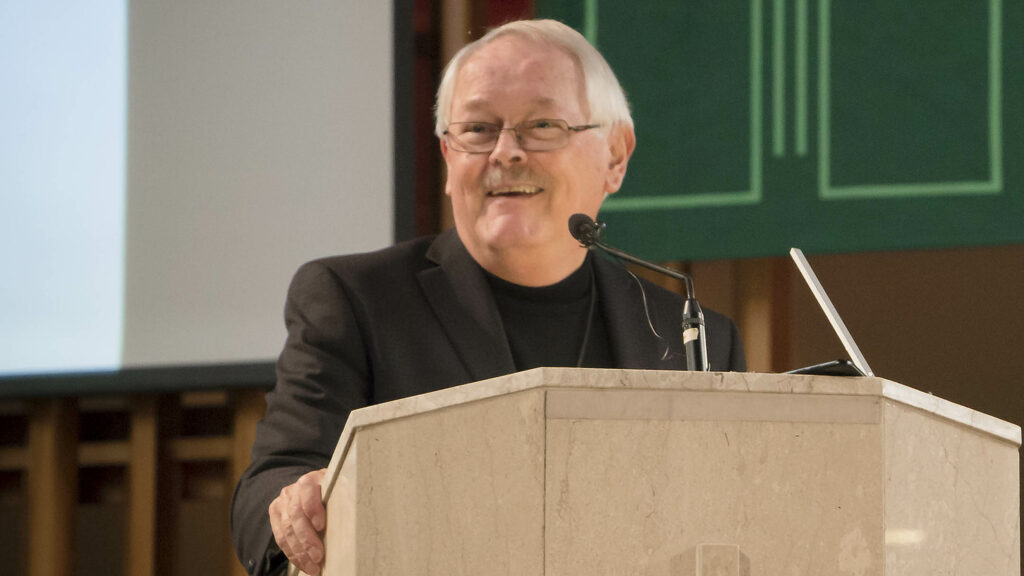Christianity, Judaism, and Islam ultimately all believe in the same God. Interestingly, too, in the popular mind they also all tend to conceive of God in the same way, namely, as male, celibate, and not being particularly happy.
Well, the gender of God is not something we can ever conceptualize. God is neither male or female, nor some androgynous mix of gender. So how can we conceptualize God’s gender? We can’t, pure and simple. Classically we’ve spoken of God as male, even as we know that this isn’t exactly true because we affirm, dogmatically, that God is ineffable, incapable of ever being captured in any concept. That also holds true for our notion of God as celibate, as not having a wife. How masculinity and femininity interrelate in God is also ineffable, incapable of being conceived of, but we know God is not simply a male celibate.
But what about that other popular notion, namely, that God is not particularly happy, especially with us?
Here we have a clear answer: God is happy. How can God not be? If God is perfect oneness, perfect goodness, perfect truth, perfect beauty, and perfect fullness in every way, how then can God not be perfect happiness?
An unhappy God would not be God for such a God would be lacking the power to make Himself (pardon the pronoun) happy. Not a minor inadequacy for God. So a perfect God is also a perfectly happy God. But that’s a metaphysical statement.
We can still ask, is God happy emotionally and is God happy with us? Mustn’t God frown at times and shake his head in disappointment at our behavior? Surely God can’t be happy with a lot that goes on in our world. God can’t be happy in the face of sin.
Well, just as in every other thing about God, there are things here we cannot comprehend. However, this much must be affirmed, both from what’s deepest in revelation in our scriptures and from the testimony of countless good people: God is happy!
God is not habitually disappointed with us, frowning at our weaknesses, and sending the majority of us to hell. Rather, God is like the loving parent of a little child, forever luring us forwards, delighting in our energy, wanting us to flourish, saddened when we act in ways that bring unhappiness to others and to ourselves, but understanding of weakness rather than angry and unhappy.
Julian of Norwich, the famed mystic, describes God this way:
God sits in heaven, smiling, completely relaxed, his face looking like a marvelous symphony.
When I first read this passage some years ago, I was taken aback both by the concept of God as smiling and by the image of God as relaxed. I had never thought of God as “relaxed”. Surely with all that’s happening in our world and surely with all the betrayals, large and small, in our lives, God must be tense, frustrated and anxious. It’s difficult but easier to picture God as smiling (at least sometimes), but it’s exceedingly difficult to picture God as relaxed, as not being tense about all that’s wrong with us and our world.
Here’s my journey in grappling with that. I was wonderfully blessed in my religious background. From my parents and family, through the parish community I grew up in, through the Ursuline nuns who taught me in school, you couldn’t have ordered a more-ideal faith milieu. I experienced faith and religion being lived out in real life in a way that gave it credibility and made it attractive.
My seminary training and theological studies strongly reinforced that. But, all that time, underneath, there was a picture of a God who wasn’t very happy and who smiled only when the occasion merited it, which wasn’t very often.
The consequence of that in my life was an anxious attempt always to measure up, to be good enough, to not make God unhappy, and to earn God’s approval and affection. But of course, we can never be good enough, never measure up, and so it’s natural to believe that God is never really happy with us and never really happy at all.
In theory, of course, we know better. We tend to have a healthier concept of God theoretically; but the heart is not so easy to bring onside. It’s hard to feel inside myself that God is happy, happy with us, happy with me.
It has taken me seventy years to realize, accept, take consolation in, and finally bathe in the fact that God is happy. I’m not sure what pulled all the triggers inside me that helped me make that shift, but the fact that God is happy comes to me now whenever I’m praying whole-heartedly, nakedly, and sincerely. It’s also what comes to me when I look at the saints in my life, those men and women whom I most look up to in faith, who reflect the face of God for me. They’re happy, relaxed, and not perpetually frowning in displeasure.

